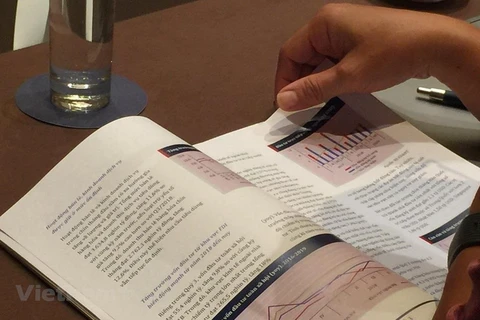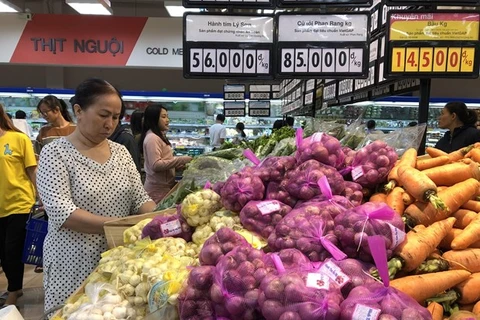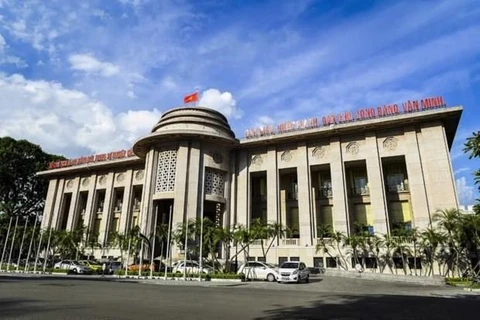Hanoi (VNS/VNA) - A looser monetary policy should be instituted to support economic growth in the wake of global volatilities, especially the outbreak of the novel coronavirus (nCoV), experts suggested.
Banking and finance expert Nguyen Tri Hieu said that Vietnam has so far seen initial damage from the virus, with business and production declining in many industries, especially agriculture, retail, tourism and transport.
The Ministry of Planning and Investment has so far also estimated the country’s GDP growth rate would be at 6.27 percent in 2020, 0.53 percentage points lower than the target set by the Government in its Resolution No 1 if the epidemic is controlled promptly in the first quarter of this year.
GDP growth would be at only 6.09 percent, 0.71 percentage points lower than the target if the epidemic is controlled in the second quarter.
Besides the epidemic, according to Hieu, difficulties caused by the US-China trade war, Brexit, and political and military crisis in the Middle East would also have significant adverse impacts on the Vietnamese economy.
“The Vietnamese economy this year is facing more challenges than last year, so a loose monetary policy is needed,” Hieu said, proposing interest rate cuts and stimulus packages for some affected industries.
Sharing the same view, experts from Bao Viet Securities Company said that the new strain of coronavirus is impacting almost every aspect of the Vietnamese economy.
“An economic slowdown in the second half of the first quarter due to the virus may be the motivation for a looser monetary policy from the central bank,” the experts predicted.
Central banks in many Asian countries have so far also loosened monetary policies to support their economies.
Late last week, the Philippines was the latest country, following China, the Republic of Korea (RoK), Thailand and Singapore, to cut the key reverse repo rate by 25 basis points to 3.75 percent, aiming to support growth.
The Vietnamese central bank has so far asked commercial banks to implement credit measures to support affected firms and individuals, including rescheduling debt payments and reducing lending interest rates.
The State Bank of Vietnam said that it was willing to support the liquidity of commercial banks, noting that if necessary, it would also adjust interest rate policy, thereby indirectly supporting commercial banks to reduce interest rates and support businesses.
Seeing downside risks to Asia’s growth outlook due to the nCoV outbreak in China and forecasting the region's growth to slow to 4.0 percent from 4.3 percent in 2019 if China’s economy were to slow to 5.4 percent this year from 6.1 percent last year, analysts from Fitch Solutions also highlighted that some countries have more policy space to support their economies and thereby cushion the negative impact of the epidemic. However, it remains concerned about those economies with weaker healthcare systems and macroeconomic fundamentals.
“We note that while downside risks are exacerbated, several countries, particularly those with high savings rates and fiscal capacity, have already announced mitigating measures to cushion the blow," Fitch analysts said.
Fitch took Thailand and the RoK as examples. The Thai government has announced a potential stimulus package targeted at supporting consumers and the travel sector. This package would be in addition to the planned fiscal stimulus via the still to be passed 2020 budget and a tax package aimed at encouraging investment approved by the cabinet recently.
The RoK government meanwhile has announced that it will use up to 20.8 billion won to offset the slowing impact of the coronavirus outbreak.
“As we have highlighted, while some economies will be able to take quick mitigating measures, others may struggle more over the forthcoming months,” Fitch noted./.
Banking and finance expert Nguyen Tri Hieu said that Vietnam has so far seen initial damage from the virus, with business and production declining in many industries, especially agriculture, retail, tourism and transport.
The Ministry of Planning and Investment has so far also estimated the country’s GDP growth rate would be at 6.27 percent in 2020, 0.53 percentage points lower than the target set by the Government in its Resolution No 1 if the epidemic is controlled promptly in the first quarter of this year.
GDP growth would be at only 6.09 percent, 0.71 percentage points lower than the target if the epidemic is controlled in the second quarter.
Besides the epidemic, according to Hieu, difficulties caused by the US-China trade war, Brexit, and political and military crisis in the Middle East would also have significant adverse impacts on the Vietnamese economy.
“The Vietnamese economy this year is facing more challenges than last year, so a loose monetary policy is needed,” Hieu said, proposing interest rate cuts and stimulus packages for some affected industries.
Sharing the same view, experts from Bao Viet Securities Company said that the new strain of coronavirus is impacting almost every aspect of the Vietnamese economy.
“An economic slowdown in the second half of the first quarter due to the virus may be the motivation for a looser monetary policy from the central bank,” the experts predicted.
Central banks in many Asian countries have so far also loosened monetary policies to support their economies.
Late last week, the Philippines was the latest country, following China, the Republic of Korea (RoK), Thailand and Singapore, to cut the key reverse repo rate by 25 basis points to 3.75 percent, aiming to support growth.
The Vietnamese central bank has so far asked commercial banks to implement credit measures to support affected firms and individuals, including rescheduling debt payments and reducing lending interest rates.
The State Bank of Vietnam said that it was willing to support the liquidity of commercial banks, noting that if necessary, it would also adjust interest rate policy, thereby indirectly supporting commercial banks to reduce interest rates and support businesses.
Seeing downside risks to Asia’s growth outlook due to the nCoV outbreak in China and forecasting the region's growth to slow to 4.0 percent from 4.3 percent in 2019 if China’s economy were to slow to 5.4 percent this year from 6.1 percent last year, analysts from Fitch Solutions also highlighted that some countries have more policy space to support their economies and thereby cushion the negative impact of the epidemic. However, it remains concerned about those economies with weaker healthcare systems and macroeconomic fundamentals.
“We note that while downside risks are exacerbated, several countries, particularly those with high savings rates and fiscal capacity, have already announced mitigating measures to cushion the blow," Fitch analysts said.
Fitch took Thailand and the RoK as examples. The Thai government has announced a potential stimulus package targeted at supporting consumers and the travel sector. This package would be in addition to the planned fiscal stimulus via the still to be passed 2020 budget and a tax package aimed at encouraging investment approved by the cabinet recently.
The RoK government meanwhile has announced that it will use up to 20.8 billion won to offset the slowing impact of the coronavirus outbreak.
“As we have highlighted, while some economies will be able to take quick mitigating measures, others may struggle more over the forthcoming months,” Fitch noted./.
VNA
























